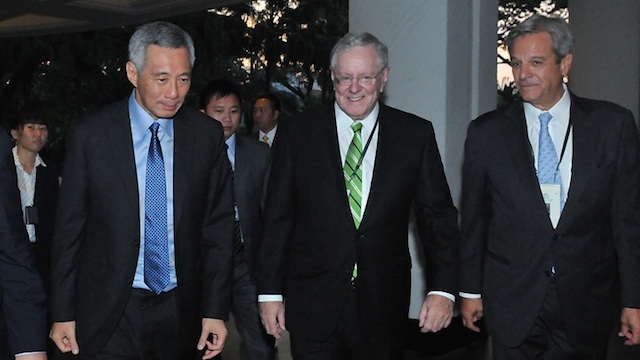SUMMARY
This is AI generated summarization, which may have errors. For context, always refer to the full article.

SINGAPORE – Singapore’s Prime Minister Lee Hsien Loong did not mince his words when asked about the role of the United States in helping resolve global disputes, including maritime rows in the region.
Speaking to a room of business players from all over the world at the Forbes Global CEO Conference here, Lee on Tuesday, October 28, said, “The US is not omnipotent. They’re a superpower, in a way the only superpower, but you cannot order things in the world as you wish – whether it’s in the Middle East, whether it’s in Ukraine.” He was interrupted by applause from the audience.
Lee had earlier been talking about China’s maritime disputes with claimant countries in the region over the South China Sea.
The Prime Minister did acknowledge, however, that the United States has “a constructive and important role to play.”
“You have friends all over the world and you can do things and play a role which no other country can,” he said, addressing the US.
Lee said America has played a “vital role” in Asia but emphasized the need for the US to do a balancing act.
“It’s a pacific power, [US President Barack] Obama has said it will remain a pacific power,” he said. “But you also have preoccupations in many other places.”
He then gave advice to the US on how to deal with the region.
“To be able to focus on Asia, to maintain your relationships, maintain good ties with China, make sure you can keep up with your other friends in Asia and be present constructively,” he said.
“But you have interests and everybody knows that. And you have a legitimate role to play because many countries in Asia welcome America’s presence and have deep ties with them.”
In Asia, the Philippines has the longest running alliance with the US. Recently, the two countries signed an Enhanced Defense Cooperation Agreement (EDCA), which allows the rotation of US troops in the Philippines, including the entry and movement of US assets. In exchange, the US is supposed to help the Philippines bulk up its defense, one of the weakest in Asia.
The agreement comes as the Philippines finds itself in the middle of a maritime dispute with China over areas in the West Philippine Sea (South China Sea). EDCA was signed during Obama’s April trip to Asia, which aimed to highlight his “ongoing commitment to increase US diplomatic, economic and security engagement with countries in the Asia-Pacific region.” – Rappler.com
Add a comment
How does this make you feel?
There are no comments yet. Add your comment to start the conversation.